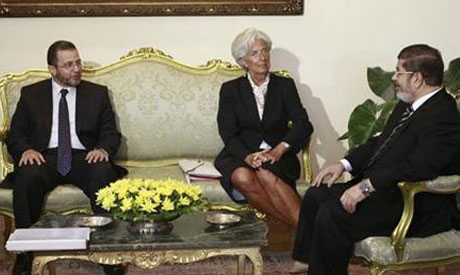 The government has revealed 24 new measures as part of an economic reform programme aimed at kick-starting Egypt's struggling economy, which will be presented to the International Monetary Fund in order to obtain approval of a badly needed $4.8 billion loan.
The government has revealed 24 new measures as part of an economic reform programme aimed at kick-starting Egypt's struggling economy, which will be presented to the International Monetary Fund in order to obtain approval of a badly needed $4.8 billion loan.
Ahram Online has obtained a copy of the economic programme, which was drafted following an 'economic initiative' conference in late December launched by the Egyptian Cabinet, in cooperation with private-sector representatives and economy experts.
The following are the most significant measures to be implemented according to the new programme.
Tax reform
The programme raises the minimum monthly salary eligible for income tax exemptions from LE9000 to LE12,000 as of October 2013.
The first bracket of the new income tax structure, which will pay 10 percent in income tax, will be extended to LE30,000 per month from a previous LE20,000.
"The increase means that employees whose monthly salaries range between LE20,000 and LE30,000 will only pay 10 percent in taxes, compared to the previous 15 percent," Assistant Finance Minister Hani Kadry told Ahram Online.
The increase, according to Kadry, will be implemented once Egypt's Shura Council (the upper house of parliament) approves it.
Additionally, a 0.001 percent tax will be imposed on all stock market transactions, while a corporate tax will be standardized at 25 percent for all companies.
As it currently stands, Egypt's corporate tax ranges between 20 and 25 percent, based on respective companies' financial situations.
Social justice
The reform programme will also raise the total number of beneficiaries of monthly social security pensions (LE300) to 1.5 million people by June of this year and 2 million people by June 2014.
The reform programme also calls for the government to adopt an emergency plan to develop Egypt's railway system at a cost of some LE1.2 billion during the current and coming fiscal years.
It also calls for developing 68 shantytowns nationwide at a total cost of some LE600 million during the 2012/13 and 2013/14 fiscal years.
The economic recovery measures also call for raising the local price of one ardeb (198 kg) of wheat by LE20 to LE400 in order to boost local production.
Foreign reserves & GDP
The Egyptian government forecasts that successful implementation of its economic recovery programme would lower Egypt's budget deficit by the end of the 2014/15 fiscal year to LE183 billion, constituting almost 7.7 percent of GDP – compared to the 10.9 percent forecast for the current fiscal year.
Egypt's current budget deficit stands at LE170 billion, approximately 10.8 percent of the country's GDP.
If the programme is successfully implemented, Egypt's foreign currency reserves – which currently stand at an alarming $13.6 billion – are expected to rise to $22 billion by the end of the current fiscal year.



